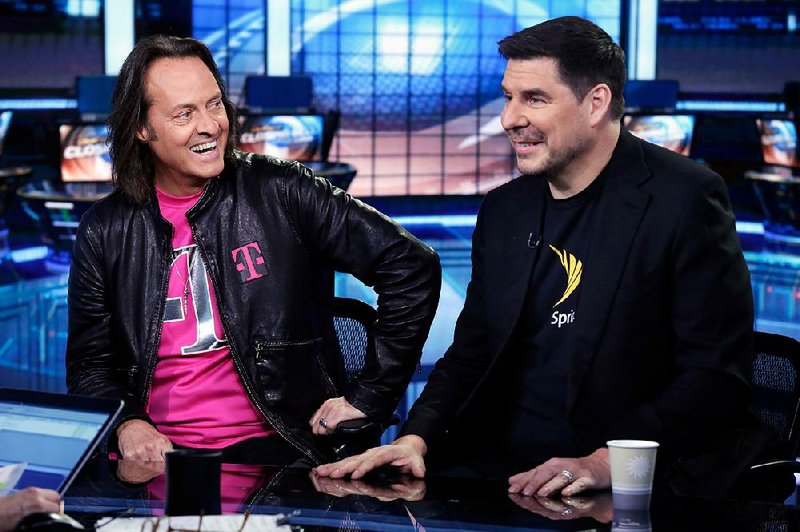NEW YORK -- A group of state attorneys general led by New York and California, and the attorney of the District of Columbia, filed a federal lawsuit Tuesday to block T-Mobile's $26.5 billion bid for Sprint, citing consumer harm.
The attorneys general said the promised benefits, such as better networks in rural areas and faster service overall, cannot be verified, while eliminating a major wireless company will immediately harm consumers by reducing competition and driving up prices for cellphone service.
New York Attorney General Letitia James said in a statement that combining the two companies would reduce access to inexpensive, reliable wireless service nationwide and would particularly affect lower-income and minority-group communities in New York and other urban areas.
Other attorneys general joining Tuesday's lawsuit are from Colorado, Connecticut, Maryland, Michigan, Mississippi, Virginia and Wisconsin. All 10 attorneys general are Democrats. The lawsuit was filed in U.S. District Court in New York.
The lawsuit is an unusual step by state officials ahead of a decision by federal antitrust authorities. The Justice Department's decision is pending. The Republican majority of the Federal Communications Commission supports the deal, though the agency has yet to vote.
Too many "mega mergers have sailed through the governmental approval process," so it's up to the states to "step up," James said at a news conference.
"There's no rule or regulation that we have to wait for the [Justice Department]," she said. She added that the attorneys general will "continue to litigate whether the [department] approves the merger or not."
Diana Moss, the president of the American Antitrust Institute and an advocate for tougher antitrust enforcement, said the states' lawsuit could signal to other potential merger partners that there would be tougher enforcement from states even if the federal government permitted deals to go through.
James said Tuesday that her office's renewed focus on mergers and anti-competitiveness goes beyond the tech industry, though she did not elaborate.
T-Mobile and Sprint have argued that they need to bulk up to upgrade to a fast, powerful fifth-generation, or "5G," mobile network that competes with Verizon and AT&T. The companies are appealing to President Donald Trump's desire for the U.S. to "win" a global 5G race.
Consumer advocates, labor unions and many Democratic lawmakers worry that the deal could mean job cuts, higher wireless prices and a hit to the rural cellphone market.
Amanda Wait, an antitrust lawyer and former Federal Trade Commission lawyer, said states are acting because they disagree with what they have seen the federal government doing.
"They see the FCC accepting certain remedies and concessions that don't, in their minds, solve the problem," she said.
T-Mobile declined comment. Sprint and the Justice Department did not immediately respond to requests for comment.
One famous example of when the states and federal government diverged on a big antitrust case was in the fight against Microsoft, although that was not a merger case. Several states dissented from the Justice Department's settlement roughly 20 years ago, pushing for tougher sanctions to curtail Microsoft's ability to use its dominance in the Windows operating system to thwart competition in other technologies.
More recently, in the Bayer-Monsanto agribusiness merger, five states last year criticized the federal government's approval.
T-Mobile and Sprint previously tried to combine during President Barack Obama's administration, but regulators rebuffed them. They resumed talks on combining once Trump took office, hoping for more industry-friendly regulators.
Trump considers 5G advancement a top priority, and he has argued that China's lead in building out mobile broadband networks poses a threat to America's national security. The technology will be a key component in the development of robotics, driverless vehicles and other emerging industries.
T-Mobile has a reputation for consumer-friendly changes to the cellphone industry. T-Mobile and Sprint led the return of unlimited-data cellphone plans, for example.
T-Mobile, trying to reassure critics, promised the FCC it would build out a 5G network and invest in rural broadband on a specific time frame or pay penalties. It also promised to sell off Sprint's prepaid Boost Mobile brand and keep price increases on hold for three years.
That was enough for FCC Chairman Ajit Pai to back the deal. The other two Republican commissioners indicated they would join him.
But public-interest advocates said these conditions did not address concerns about higher prices and reduced competition-- and would be difficult for regulators to enforce.
California Attorney General Xavier Becerra said the attorneys general planned to seek a preliminary injunction so that the companies would have to resolve the lawsuit before joining forces even if the Justice Department approved the merger.
Staff attorneys at the Justice Department have reportedly told the companies that they won't approve the deal as proposed, but the ultimate decision lies with Makan Delrahim, the top antitrust official who is a political appointee. Delrahim is pushing the companies to sell parts of their businesses to maintain competition in the industry, according to two people familiar with his thinking. A decision is expected in the coming weeks.
Information for this article was contributed by Tali Arbel and Mae Anderson of The Associated Press; and by Tiffany Hsu and Matthew Goldstein of The New York Times.
Business on 06/12/2019
